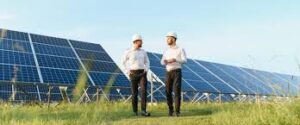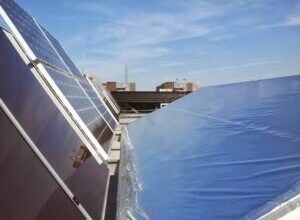
Buying second hand solar panels might seem like a good idea to save money, but it’s important to be careful. Before you decide, check if the panels are in good condition. Second solar panels can be risky. They could help you save money on electricity and reduce pollution. But they might also have hidden problems that you can’t see, so they might not work well. Take your time to look for used solar panels. You might find a good one for a lower price than a new one!
Advantages Of Second Hand Solar Panels In Nigeria
Using second hand solar panels can be cheaper upfront. This means you pay less money at the beginning. The main reason people don’t get solar panels is because they cost a lot at first. But if you buy used ones, it can be cheaper. Also, when you spend less money upfront, you can start saving money faster.
Solar Panels Are Good For The Environment: They use energy from the sun, which is renewable. This means it doesn’t run out. Solar panels help reduce the amount of pollution from homes, or even get rid of it completely.But even though solar panels are good for the environment, they’re not perfect. Making solar panels and the materials they’re made of create pollution.
Getting Your Money Back Quicker: If you buy a 3.5 kW solar panel system for your home now, it will take around 14.55 years to pay for itself. But, if you choose to buy used solar panels for half the price, you’ll break even much faster. This is especially good when energy prices are high. However, if you buy second hand solar panels that are old and not in good condition, they might not last until you break even.
Disadvantages Of Second Hand Solar Panels In Nigeria
Here are some downsides of using secondhand solar panels.
Installation Costs: Even though the panels themselves are cheap, you’ll still need to buy an inverter and pay for a professional installer to set up the system. Trying to install them yourself is risky and not recommended.
Lack of Certification: Secondhand panels can’t be certified by an accredited installer. This certification is important for receiving payments through programs like the Smart Export Guarantee. It’s also needed for certain types of funding and insurance coverage.
Less efficiency: Regular solar panels for homes usually work at about 18-22% efficiency, while better ones can be over 23% efficient. Newer models are better at making energy than older used ones because they lose about 0.3% efficiency every year. Even though second hand solar panels can still make energy and save you money on bills, they might not make as much energy or save as much money as new ones.
Shorter lifespan: It’s simple: like any used tech thing, a used solar panel won’t last as long as a new one. But if you pay less at the start, this might not matter as much to you.
New solar panels can last 25-30 years, but used ones have already been used for some of that time.
Second Hand Solar Panels Model, Wattage And Prices
| Solar Panel Model | Wattage | Price In Naira (#) |
|---|---|---|
| T Canadian Solar | 400watt | 95,000 – 105,000 |
| Son Power Solar | 300watt | 65,000 – 78,000 |
| Peak Power(PMAX) | 420watt | 85,000 – 90,000 |
| Monocrystalline Solar | 580watt | 200,000 – 220,000 |
| Sunpower Solar | 300watt | 48,000 – 53,000 |
| Africell Solar | 600watt | 165,000 – 180,000 |
| Canadian Mono Crystalline | 300watt | 47,000 – 55,000 |
| Sun Crown Solar | 500watt | 95,000 – 102,000 |
| Monocrystalline Solar | 380watt | 75,000 – 80,000 |
| Sarda Solar | 6V 6W | 8,500 – 10,000 |
| Sunshine Solar | 600watt | 120,000 -150,000 |
| Jinko Canadian Solar | 550watt | 115,000 – 120,000 |
| Motech MTPVP | 240watt | 60,000 – 65,000 |
| Foresolar | 190watt | 40,000 – 42,000 |
| Trina Mono Crystalline | 250watt | 48,000 – 50,000 |
| Chevron Mono | 320watt | 45,000 – 50,000 |
| Zex Solar Canadian | 600watt | 95,000 – 110,000 |
| Cworth Energy Solar | 600watt | 115,000 – 125,000 |
How Much Do Second Hand Solar Panels Cost In Nigeria?
Usually, second hand solar panels cost about half the price of new ones. If you’re buying them from places like Jiji.ng, Alibaba, you might find them for as little as 75,000 naira. But when the price is that low, it’s important to ask the seller some questions to know if the system is reliable – we’ll talk more about that later.
The total cost of used solar panels depends on various factors, such as:
- The size of the system
- How old it is
- The type of panel
- Its condition
- Where you’re buying it from
Should I Buy Second Hand Solar Panel
Second hand solar panels are awesome! They save you money on electricity and help the environment. But they can be expensive to buy at first. Second hand solar panels seem like a good way to save money upfront, but there are some things to think about before you buy.
Hidden Problems: It’s hard to tell if a used panel is really in good shape. Tiny cracks or other issues could be hiding, and these can make the panels work worse or even be dangerous.
No Warranty: New panels come with warranties in case they break. Used panels are sold “as-is,” which means you’re on your own if they need fixing or replacing.
Tricky Installation: Used panels might not all be the same size or brand. This can make them harder to install and might cost more for a professional to do the job.
Where Can I Buy Second Hand Solar Panel
If you’re still considering used panels, here are some resources to help you find them:
Online Marketplaces:
- Jiji.ng: This popular Nigerian online marketplace can have listings for used solar panels. Be sure to follow safe online buying practices when using Jiji.ng.
- Facebook Marketplace: Check Facebook Marketplace in your area for used solar panels. Exercise caution typical of online transactions.
- Solar-specific marketplaces: Search online for marketplaces dedicated to buying and selling used solar equipment. These might offer a more focused selection and potentially more knowledgeable sellers.
How To Spot Any Damage On Second Hand Solar Panels
I have inspected solar panels for a few years now, and here are some ways to spot damage on a solar panel in plain English:
Visible Cracks or Chips: This is the easiest one to check. Run your hand over the glass surface and look for any cracks, chips, or other signs that the glass is broken. Even a small crack can affect the panel’s performance.
Discolored Backsheet: The backsheet is the protective layer at the back of the panel. It should be a uniform color, usually black or gray. If you see any yellowing, browning, or other discoloration, it could be a sign of moisture damage or overheating, both of which can reduce efficiency.
Corrosion Around Connectors: The electrical connectors are the wires that come out of the panel. Check for any rust, greenish build-up, or other signs of corrosion around the connectors. This can cause connection problems and reduce power output.
Fogging or Delamination: If the space between the glass and the backsheet looks cloudy or hazy, that’s called fogging. It can be caused by moisture getting inside the panel. Delamination is when the layers of the panel start to separate from each other. Both fogging and delamination are signs of a damaged panel.
Here are some extra tips I use:
Shine a flashlight on the panel at an angle. This can help you see small cracks or defects that might be hard to see otherwise.
Look for hot spots. If you have a thermal imaging camera (not essential, but handy!), you can use it to check for hot spots on the panel. These are areas that are getting hotter than they should, which can be a sign of damage.
Compare the panel to others of the same type. If you’re looking at multiple used panels, compare them side-by-side. Are there any noticeable differences in color, condition, or anything else that raises a red flag?
Remember: If you’re unsure about anything, it’s always best to err on the side of caution and avoid the panel. It’s better to spend a bit more upfront on a panel in good condition than to end up with one that doesn’t work properly or needs to be replaced sooner than expected.
Making a Smart Choice
If you’re still thinking about used panels, here’s how to be careful:
Learn About Solar Panels: Do some research on different types of panels and how much power they lose over time. Learn how to spot any damage on a panel by looking at it closely.
Ask Questions: Find out everything you can from the seller about the panels’ age, where they came from, how much power they make, and if there are any known problems.
Get Help from a Pro: Hire a qualified solar installer to check the panels and see if they’ll work well for your project. They can also estimate how much power they’ll make and tell you if they’ll be difficult to install.
Think About Future Costs: Even though used panels are cheaper upfront, consider that you might need to replace them sooner and you won’t have a warranty. Factor these costs into your decision.
Other Options to Consider
Before you decide on used panels, there might be better choices:
Financing: Many solar companies offer financing plans that can make new panels more affordable. You can spread out the cost over time with monthly payments.
Smaller New System: Instead of buying a big used system, consider getting a smaller, new system that fits your budget. You can always add more panels later.
Summary
Used solar panels can be a good option in Nigeria. If you’re handy, know a lot about solar power, and can find well-maintained panels at a great discount, they might be worth considering. But for most people, new panels are a safer bet in the long run. They offer better efficiency, a longer lifespan, and peace of mind, and there might be financial incentives available to help with the upfront cost.
Read more on solar batteries price in Nigeria.

One Comment